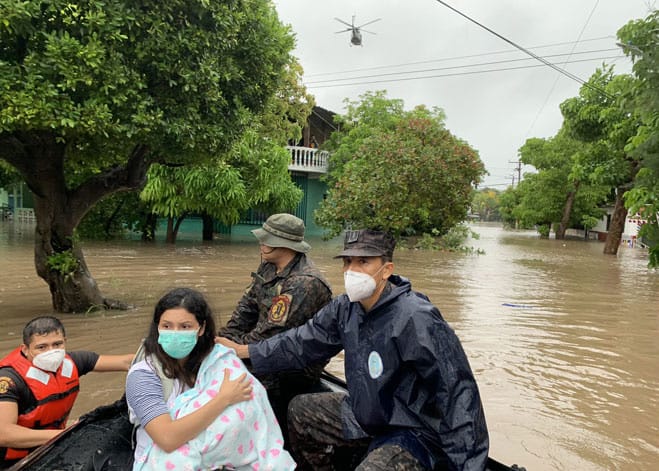
USAID Monitoring, Evaluation & Learning Initiative
Improving the effectiveness, sustainability, and impact of USAID programs in El Salvador
Overview
ME&A implements the five-year Monitoring, Evaluation, and Learning (MELI) initiative for the USAID Mission in El Salvador. The main goal is to enhance USAID's monitoring, evaluation, and learning (ME&L) capability in El Salvador and occasionally, upon request, in Guatemala, Honduras, Mexico, and Nicaragua. ME&A’s team provides USAID/El Salvador and other missions in the region continued performance monitoring, verification, Geographic Information System (GIS) services, and evaluation support to measure program impact, results, and achievements. Randal Joy Thompson, Ph.D, is chief of party of the initiative running from 2016 to 2021.
Six Components
MELI is made up of six components: Performance Monitoring; Performance and Impact Evaluations; GIS; Research, Assessments, and Data Analysis; Knowledge Management and Learning; and Training.
MELI REGIONAL MAP

Performance Monitoring
MELI performance monitoring activities assist USAID/El Salvador in making evidence-based decisions. These activities include collecting baseline, mid-term, and end-line data; conducting randomized field visits; updating the Mission’s Performance Management Plans (PMPs); and preparing periodical performance reports for diverse audiences. Highlights include:
- Collecting data and creating GIS maps, dashboards, and data analytics to track U.S. government and other international humanitarian organizations' assistance to combat COVID-19 and provide humanitarian relief after tropical storms Amanda and Iota.
- Collecting baseline, mid-term, and end-line data from 6,000 households to assist El Salvador reduce and prevent violence, better serve victims of crime, and reduce impunity in high-risk communities.
- Conducting data cleaning and analysis of migration data for Guatemala and El Salvador.
- Developing a robust database of contextual indicators, collecting and updating them systematically for mapping purposes, and analyzing them to uncover connections and patterns to inform USAID decisions going forward.
PBS/PBJ IMPACT EVALUATION
Performance and Impact Evaluations
Services under this component includes designing evaluations, staffing evaluation teams, and conducting planned performance and impact evaluations. To date, MELI has completed nine performance and impact evaluations in El Salvador, Nicaragua, and Mexico. They include:
Final Performance Evaluation Regional Integrated Trade and Food Security Strategy
Mid-Term Performance Evaluation of Education for Children and Youth Activity
Final Performance Evaluation of the Regional Climate Change Program
Ex-Post Performance Evaluation of USAID Fiscal Policy Development Activities
Mid-Term Performance Evaluation of USAID/Mexico's Promoting Justice Activity (PROJUST)
Final Performance Evaluation of the Higher Education for Economic Growth Project
Mid-Term Performance Evaluation of the USAID Regional Trilateral Cooperation Activity
Final Performance Evaluation of the Regional Citizen Security Activity (InfoSegura)
Evaluation of the Reasons for Dropping out of the Training of the USAID/Bridges Project
Place-Based Security/Place-Based Justice Impact Evaluation
Nicaragua Evaluation Development Objective 2: Safety and Competitiveness of At-Risk Children and Youth in Targeted Areas Improved, Final Performance Evaluation
Geographic Information Systems
MELI has produced some 250 GIS maps for USAID/El Salvador on topics ranging from migration, remittances, and homicides to environmental management and COVID-19 relief. This work includes collecting geographic coordinate data, managing and maintaining mapping databases, and analyzing mapped data. USAID and the U.S. Embassy use MELI GIS maps to track and plan development assistance. MELI also provides GIS services to Guatemala.
Research, Assessments, and Data Analysis
MELI designs research studies, assessments, and data analysis to assist USAID/El Salvador provide accountability, oversight, and management of programs and partners. This includes feasibility studies and situational analyses, sectoral assessments, rapid appraisals, and surveys. Research products to date include:
- El Salvador Education Sector Assessment
- Baseline Assessment for Indicators Related to Compliance with Regulations for Access to Public Information in 13 Municipalities
- Baseline Study of the Higher Education for Economic Growth Activity
- Diagnostic Assessment of the Functioning of Plural Municipal Councils
- Political Economy Analysis – Central American Electricity Integration Program
- Tropical Forest and Biodiversity Assessment
- USAID/El Salvador Country Development Cooperation Strategy Literature Review and Analytical Report
- Cooperation Strategy 2019-2023 El Salvador Youth
- USAID/El Salvador Gender and Inclusive Development Analysis
Knowledge Management and Learning
MELI conducts regular knowledge management and learning (KML) events to harness the collective knowledge of USAID implementing partners (IPs) while bridging the gap between what monitoring, evaluation, and project reports recommend and actual field practices. These events focus on learning, sharing, and adapting to knowledge, including USAID's Collaborating, Learning, and Adapting (CLA) set of practices to improve development effectiveness. MELI has conducted KML workshops for some 30 IPs and almost 200 participants under this component.
Training
Under this component, MELI trains IPs, researchers of national and regional partner institutions, and other donor partners and stakeholders to strengthen their MELI and adaptive management capacity. At the beginning of the initiative, MELI conducted a needs assessment to determine what training to provide. Based on this assessment, MELI to date has conducted almost 40 trainings with some 250 participants from almost 40 IPs. Topics included tracking gender equity in development programs, managing USAID's Journey to Self-Reliance, GIS in MELI, report writing, contracting systems, financial administration, and ensuring data quality.